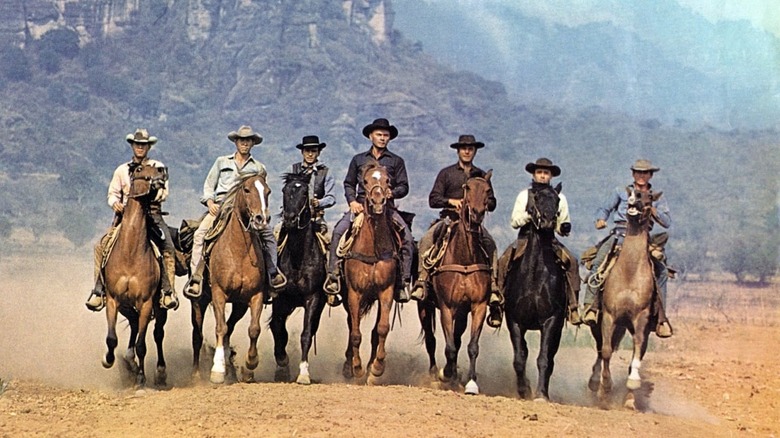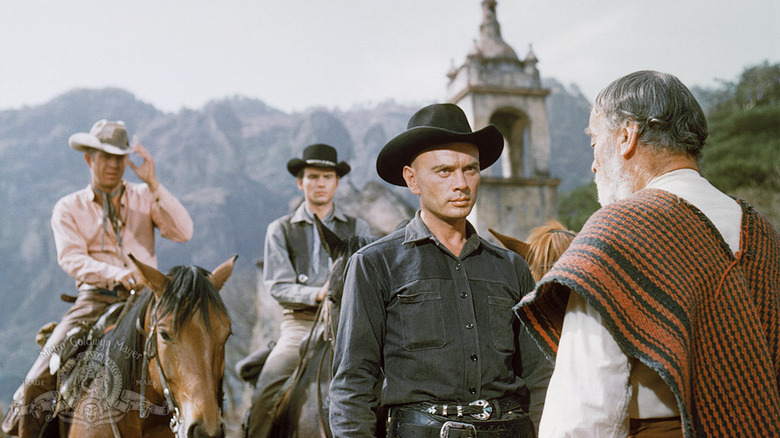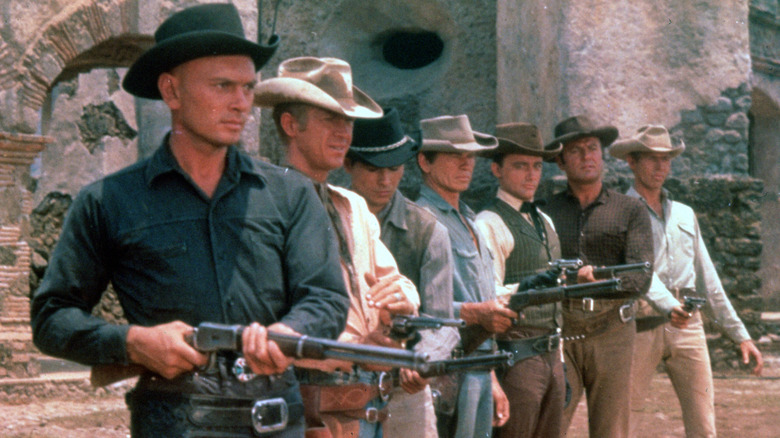1960's The Magnificent Seven Faced A Tight Deadline That Could Have Killed The Movie
There wasn't a more capable director of massive, widescreen Westerns working in Hollywood during the 1950s and '60s than John Sturges. Whether classical ("Gunfight at the O.K. Corral") or somewhat unconventional ("Bad Day at Black Rock"), Sturges could frame a mountainous expanse or stage a gunfight with the best of them (namely John Ford, Howard Hawks, and Anthony Mann). He thrived when working with big casts and specialized in discovering stirring nuances in characters that would've been walking cliches in more typical genre flicks.
Sturges was also efficient, which came in handy when managing expensive studio productions populated with big egos. His biggest challenge in this department might've been "The Magnificent Seven," the 1960 remake of Akira Kurosawa's masterpiece "Seven Samurai." Yul Brynner, then a hugely popular movie star (largely on the strength of his Academy Award-winning performance in "The King and I" and his portrayal of Ramses in Cecil B. DeMille's "The Ten Commandments"), controlled the rights to the film and teamed with producer Walter Mirisch to bring it to epic life. Though the film would be an ensemble piece, he was first on the call sheet and wasn't shy about flaunting his status.
This didn't sit down well with Steve McQueen, the cocky, up-and-coming star of television's "Wanted Dead or Alive." McQueen viewed "The Magnificent Seven" as an express ticket out of the small-screen medium (TV was still considered second class compared to movies), so he was hot to make his big-screen mark and expand his supporting character to a co-lead. Sturges could manage big egos, but this project came freighted with a major complication: the Screen Actors Guild was preparing to go on strike in the spring. How did he handle the pressure?
The Magnificent Seven nearly went on strike
The major headache for Sturges here had, at least initially, nothing to do with Brynner and McQueen. It was the other five members of the titular team that was a problem, primarily because he had yet to cast them.
This is where the strike threatened to shut down "The Magnificent Seven." As actor Robert Vaughn recalled, "Unless the casting for a picture was completed by noon on a particular Friday, production couldn't begin."
Though Sturges and Brynner were respected by their peers, many name actors were reluctant to join the production as supporting members of the seven; e.g. John Ireland and Sterling Hayden rejected the role of knife-thrower Britt (a part that went a long way toward making James Coburn a star). There was also the matter of casting the numerous villagers and the villains. It wasn't quite a cast of thousands, but there were dozens of speaking roles to fill, and that strike date wasn't going away.
John Sturges was a crisis-averting machine
Sturges finalized his cast in the nick of time, and, once shooting began, successfully kept Brynner and McQueen from coming to blows — though McQueen did his best to undermine his co-star on- and off-screen. When asked about their rocky on-set relationship, Brynner, to his credit, refused to take the bait. "I never feud with actors," he said. "I feud with studios."
You may be surprised to learn that "The Magnificent Seven" was not a box office hit in the United States (it barely broke even on its $2 million budget), but eventually became quite profitable via its international release. The film spawned three ho-hum sequels ("Return of the Seven," "Guns of the Magnificent Seven," and "The Magnificent Seven Ride!"), but these films couldn't come close to touching the visual perfection of Sturges' original (though they at least featured Elmer Bernstein's Aaron Copeland-inspired score). Meanwhile, Sturges went on to re-team with several of his "The Magnificent Seven" stars (McQueen, Coburn, and Charles Bronson) for what wound up being his finest film, "The Great Escape."


